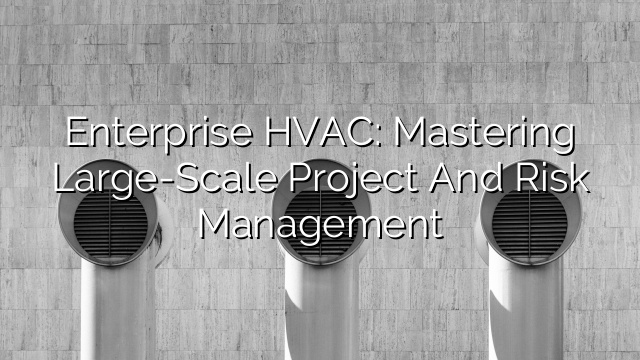Introduction
For any business, managing large-scale projects and mitigating risks are crucial for success. This holds particularly true for enterprise-level HVAC projects, where the stakes are high, budgets are substantial, and the impact on operations is significant. In this blog post, we will explore the importance of project management in enterprise HVAC, and how to effectively manage risks to ensure a successful outcome.
The Importance of Project Management in Enterprise HVAC
Enterprise HVAC projects involve complex systems that are critical for the smooth operation of businesses. These projects often require the installation or upgrade of HVAC systems that can span multiple buildings, floors, or even entire campuses. Without proper project management, these undertakings can quickly become chaotic, resulting in cost overruns, delays, and subpar system performance.
Effective project management in enterprise HVAC involves careful planning, coordination, and execution of various tasks, ensuring that projects are completed within budget and on time, while meeting the desired performance and efficiency levels.
A professional project manager plays a crucial role in overseeing the entire project lifecycle, from inception to completion. They are responsible for developing a comprehensive project plan, identifying necessary resources, managing schedules, coordinating with vendors and contractors, and ensuring quality control at every stage of the project.
Mastering Large-Scale Project Management in Enterprise HVAC
The successful management of large-scale enterprise HVAC projects requires a systematic approach, attention to detail, and effective communication. Here are some key steps to master large-scale project management:
- Develop a Comprehensive Project Plan: Start by developing a detailed project plan that outlines the project scope, goals, timeline, deliverables, and resource requirements. This plan will serve as a roadmap, guiding the project team throughout the execution phase.
- Identify and Allocate Resources: Identify the necessary resources such as funds, equipment, materials, and manpower required for the project. Allocate resources effectively to ensure that they are available when needed, and ensure that budgets are managed efficiently.
- Establish Clear Communication Channels: Communication is key to successful project management. Establish clear communication channels between project stakeholders, including the project team, contractors, vendors, and key decision-makers. Regular progress meetings and reports should be scheduled to monitor the project’s status and address any issues or concerns.
- Coordinate Tasks and Sub-projects: Divide the project into smaller tasks or sub-projects, and assign responsibilities to team members or subcontractors. Coordinate these tasks effectively to ensure that work is progressing as planned and that any dependencies are managed effectively.
- Monitor and Control Project Progress: Regularly monitor project progress by tracking key metrics such as budget, schedule, and quality. Identify any deviations from the project plan and take necessary corrective actions. Effective project control is crucial to maintaining project stability and avoiding costly delays or budget overruns.
- Manage Stakeholder Expectations: Keep stakeholders informed about project progress, potential risks, and any changes that may impact the project. Managing stakeholder expectations and addressing concerns in a timely manner is critical for maintaining their support and preventing any roadblocks.
- Perform Quality Assurance and Testing: Ensure that the HVAC systems are installed or upgraded according to specifications. Perform quality assurance inspections and testing to verify system performance, energy efficiency, and compliance with regulatory standards.
- Document Lessons Learned: Once the project is completed, document lessons learned and best practices. This information can be valuable for future projects, allowing for continuous improvement and more efficient execution.
Mastering Risk Management in Enterprise HVAC Projects
Risk management is another critical aspect of enterprise HVAC projects, as it helps identify potential risks and develop strategies to mitigate them. Here are some key steps to master risk management in large-scale enterprise HVAC projects:
- Identify Potential Risks: Conduct a comprehensive risk assessment to identify potential risks that can impact the project. This can include risks related to design, construction, procurement, scheduling, and regulatory compliance.
- Analyze and Prioritize Risks: Analyze the identified risks and prioritize them based on their impact and probability of occurrence. This will help focus resources on the most critical risks and develop appropriate risk mitigation strategies.
- Develop Risk Mitigation Strategies: Develop a risk mitigation plan that outlines specific strategies to minimize the impact of identified risks. This plan should include contingency plans, alternative approaches, and mitigation measures to address potential risks.
- Monitor and Control Risks: Regularly monitor the identified risks throughout the project lifecycle. Implement risk control measures and review their effectiveness. Continuously assess new risks and adapt the risk mitigation strategies as needed.
- Ensure Regulatory Compliance: Identify regulatory requirements and ensure compliance throughout the project. Non-compliance can lead to delays, fines, and potential legal issues. Engage with regulatory bodies early in the project to understand the requirements and implement necessary measures.
- Engage Expert Consultants: Consider engaging external experts or consultants who specialize in risk management for HVAC projects. Their expertise can add value by providing insights, identifying blind spots, and developing effective risk mitigation strategies.
Conclusion
Mastering large-scale project management and risk management is crucial for the success of enterprise HVAC projects. By effectively managing projects and mitigating risks, businesses can ensure that their HVAC systems are installed or upgraded efficiently, providing optimal comfort and energy efficiency. Professional project management and risk management practices, along with effective communication and stakeholder engagement, are key to achieving successful outcomes and avoiding costly delays or budget overruns.
FAQs
Q: How long does it take to complete an enterprise HVAC project?
A: The duration of an enterprise HVAC project can vary depending on factors such as the size and complexity of the project, the availability of resources, and any unforeseen challenges that may arise during the execution phase. It is best to consult with a professional project manager to estimate the timeline for a specific project.
Q: Are there any specific certifications or qualifications required for enterprise HVAC project managers?
A: While there are no specific certifications or qualifications exclusively for enterprise HVAC project managers, a professional project manager typically holds certifications such as Project Management Professional (PMP) or other relevant industry certifications. They also possess extensive experience and expertise in managing large-scale projects, particularly in the HVAC industry.
Q: How can I ensure the quality of an enterprise HVAC project?
A: To ensure the quality of an enterprise HVAC project, it is important to work with reputable contractors and vendors who have a track record of successful installations or upgrades. Additionally, conducting regular quality assurance inspections and testing throughout the project, as well as engaging independent third-party experts for verification, can help ensure compliance with specifications and regulatory standards.
Q: What are common risks associated with enterprise HVAC projects?
A: Common risks in enterprise HVAC projects include design and specification errors, delays in procurement or delivery of equipment, unforeseen site conditions, coordination challenges between subcontractors, regulatory compliance issues, and budget overruns. Conducting a comprehensive risk assessment and developing appropriate mitigation strategies can help address these risks proactively.
Q: Can I manage an enterprise HVAC project without professional project management expertise?
A: While it is possible to manage an enterprise HVAC project without professional project management expertise, it is not recommended. Enterprise projects involve significant investments and have substantial impact on operations. Engaging a professional project manager with experience in large-scale HVAC projects can ensure effective planning, execution, and risk management, leading to better outcomes and minimizing potential risks.






